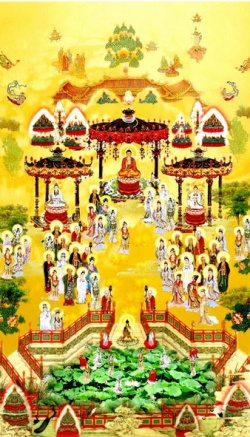Difference between revisions of "Sacred Way teachings"
Jump to navigation
Jump to search
| Line 1: | Line 1: | ||
[[File:Amt8.jpg|thumb|250px|]] | [[File:Amt8.jpg|thumb|250px|]] | ||
<poem> | <poem> | ||
| − | [[Sacred]] | + | [[Sacred Way teachings]] |
[[聖道門]] ( Jpn [[Shodo-mon]]) | [[聖道門]] ( Jpn [[Shodo-mon]]) | ||
Revision as of 15:01, 11 September 2013
Sacred Way teachings
聖道門 ( Jpn Shodo-mon)
The teachings that hold that attaining enlightenment depends upon one's own power. The term Sacred Way teachings is used in contrast with Pure Land teachings, which assert that enlightenment depends upon the power of another, specifically, Amida Buddha. Tao-ch'o (562-645), a patriarch of the Chinese Pure Land school, formulated the classification of the Buddhist teachings into these two categories in his Collected Essays on the World of Peace and Delight. He asserted that the Sacred Way teachings were too difficult and profound for ordinary people to practice, and that only through the recitation of Amida Buddha's name as expounded in the Pure Land teachings could they attain salvation.
